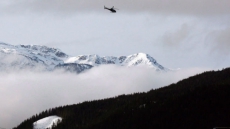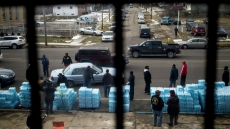OTTAWA — The vast majority of the 26,000 Syrian refugees who arrived in Canada by the end of last month showed up healthy, newly published government data suggests.
But while the study by Public Health Agency of Canada staff said the newcomers posed no risk to public health, it noted it will take time for chronic medical and mental-health conditions to present and health-care professionals need to remain vigilant.
The Immigration Department has published data on some of the newly arrived Syrians, but the public health study is the first comprehensive look at the entire group.
The researchers focused on communicable diseases among those resettled in Canada as part of the Liberal program to bring 25,000 people here by the end of February.
All applicants had medical exams as part of the program, though how many were rejected for medical reasons is unknown. The review found of those accepted, two had potential cases of non-infectious tuberculosis.
None tested positive for syphilis or HIV. Ten were sent to hospital upon arrival for possible communicable diseases, though none ended up a concern to public health. Another 54 were hospitalized upon arrival for other urgent reasons.

"Large-scale refugee movements place pressure on health-care systems, both in their immediate response and as part of long-term resettlement efforts," the study, published this month in the Canadian Communicable Disease Report, concluded.
"As Syrians integrate into Canada, meeting their longer-term, health-care needs will call for a seamless network of health-care providers, supported by community partners."
The study observed refugees tend to under-report chronic health conditions for fear of being rejected and estimated about five per cent of the arriving Syrians have some kind ongoing health-care need. Mental-health issues will also take time to surface, the report said.
It also found a number of children arrived with illnesses including cancers, seizures and developmental disorders. Malnutrition and children with intellectual disabilities were also observed.
The incidence of those appears to be higher than in the general Canadian population, said Dr. Anna Banerji, the pediatrician who screened Syrian children as they landed in Toronto.
She said it's not unusual for government-assisted refugees to have complex health requirements — they are selected for resettlement on the basis of vulnerability and medical needs contribute to that status.
It's also common for settlement agencies to have no inkling of incoming medical needs, but the Syrian program amplified the challenge with so many people arriving in such a short time.

In her day-to-day work with refugees, Banerji usually has time for a detailed physical exam, blood work, vaccinations and parasite checks. With the Syrians, she was just putting out fires because of the volume of arrivals.
Linking children up with the right health care was also more difficult because of housing shortages delaying getting them out of airport hotels and into permanent homes.
"Eventually they will settle through, but it wasn't an easy time for many families," Banerji said.
The report noted the most immediate need upon arrival was catching up on immunizations and dental care.
In Toronto, more than 500 dental emergencies were addressed. Patients of all ages had severe diseases in their mouth and weren't able to sleep or eat because of the pain, said Dr. Hazel Stewart, the director of dental and oral health services at Toronto Public Health.
The drive now is to connect everyone to ongoing dental care, as it's not just a health issue, Stewart said.
"Some of them are missing front teeth, and employment becomes a challenge if you're not able to speak and smile."



